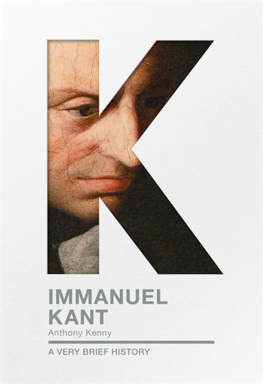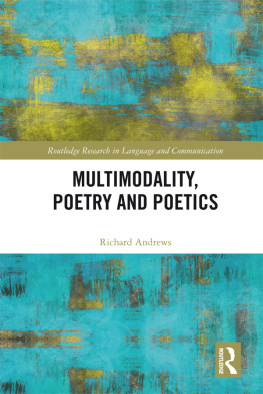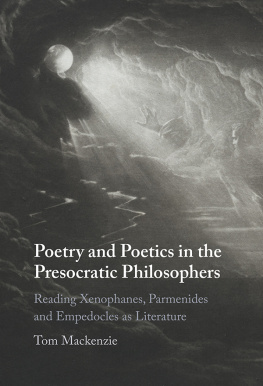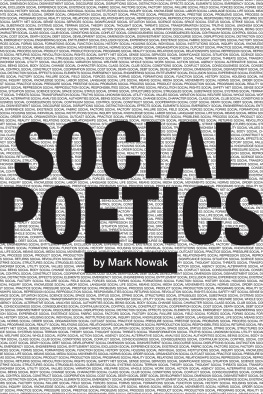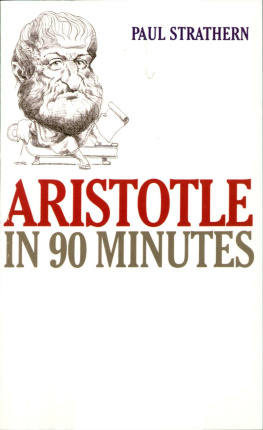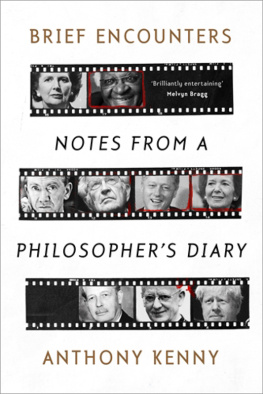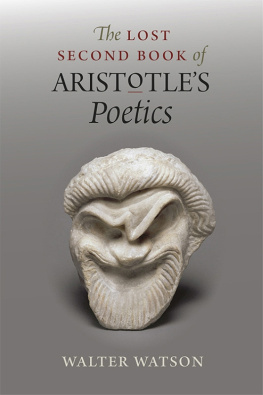OXFORD WORLDS CLASSICS
POETICS
ARISTOTLE (384322 BC), with Plato one of the two greatest philosophers of antiquity, and in the view of many the greatest philosopher of all time, lived and taught in Athens for most of his career. He began as a pupil of Plato, and for some time acted as tutor to Alexander the Great. He left writings on a prodigious variety of subjects, covering the whole field of knowledge from biology and astronomy to rhetoric and literary criticism, from political theory to the most abstract reaches of philosophy. He wrote two treatises on ethics, called Eudemian and Nicomachean after their first editors, his pupil Eudemus and his son Nicomachus.
SIR ANTHONY KENNY is an Emeritus Fellow of St Johns College, Oxford. He is a former Master of Balliol College and Pro-Vice-Chancellor of the University of Oxford and was President of the British Academy from 1989 to 1993. His many books include The Aristotelian Ethics (1978), Aristotles Theory of the Will (1979), Aristotle on the Perfect Life (1992), and A New History of Western Philosophy (2010). For Oxford Worlds Classics he has also translated The Eudemian Ethics (2011).
OXFORD WORLDS CLASSICS
For over 100 years Oxford Worlds Classics have brought readers closer to the worlds great literature. Now with over 700 titlesfrom the 4,000-year-old myths of Mesopotamia to the twentieth centurys greatest novelsthe series makes available lesser-known as well as celebrated writing.
The pocket-sized hardbacks of the early years contained introductions by Virginia Woolf, T. S. Eliot, Graham Greene, and other literary figures which enriched the experience of reading. Today the series is recognized for its fine scholarship and reliability in texts that span world literature, drama and poetry, religion, philosophy, and politics. Each edition includes perceptive commentary and essential background information to meet the changing needs of readers.
Refer to the to navigate through the material in this Oxford Worlds Classics ebook. Use the asterisks (*) throughout the text to access the hyperlinked Explanatory Notes.
OXFORD WORLDS CLASSICS

ARISTOTLE
Poetics

Translated with an Introduction and Notes by
ANTHONY KENNY


Great Clarendon Street, Oxford OX2 6DP
United Kingdom
Oxford University Press is a department of the University of Oxford.
It furthers the Universitys objective of excellence in research, scholarship,
and education by publishing worldwide. Oxford is a registered trade mark of
Oxford University Press in the UK and in certain other countries
Aristotle translation and editorial material Anthony Kenny 2013
Additional copyright information appears on xl
The moral rights of the author have been asserted
First published as an Oxford Worlds Classics paperback 2013
Impression: 1
All rights reserved. No part of this publication may be reproduced, stored in
a retrieval system, or transmitted, in any form or by any means, without the
prior permission in writing of Oxford University Press, or as expressly permitted
by law, by licence or under terms agreed with the appropriate reprographics
rights organization. Enquiries concerning reproduction outside the scope of the
above should be sent to the Rights Department, Oxford University Press, at the
address above
You must not circulate this work in any other form
and you must impose this same condition on any acquirer
British Library Cataloguing in Publication Data
Data available
Library of Congress Cataloging in Publication Data
Data available
ISBN 9780199608362
Printed in Great Britain by
Clays Ltd, St Ives plc
CONTENTS
INTRODUCTION
The Literary Legacy of Greece
Of all the treasures that ancient Greece has bequeathed to us, its literature is the one that is best preserved. Greek architecture survives in ruins, Greek sculptures have suffered amputations, Greek paintings have almost vanished, and no one really knows how Greek music sounded. However, many masterpieces of literature have survived intact to be read and enjoyed across the centuries. We possess fine specimens of epic and lyric, of tragedy and comedy, of history and philosophy, and of rhetorical and political oratory. Moreover, Greece provided us not only with the earliest European literature, but also with the very earliest literary criticism, to which the present volume bears witness.
Epic was the first genre to be perfected in Greece. The Iliad and the Odyssey of Homer purport to recount events of the Trojan war of the thirteenth century BC, but they were probably put together in their present form in the eighth century. Perhaps at the end of that century, the poet Hesiod wrote epic texts on agriculture and on the gods of the Greek pantheon. In the late seventh century the poetess Sappho of Lesbos wrote enchanting love lyrics. The most famous Greek lyric poet was Pindar (518446), who wrote odes in honour of the victors in panhellenic contests such as the Olympic Games.
The most glorious days of ancient Greece fell in the fifth century BC, during fifty years of peace between two periods of warfare. The century began with wars between Greece and Persia, and ended with a war between the city states of Greece itself. In the middle period flowered the great civilization of the city of Athens.
In 499 BC Greeks living in Ionia (now part of Turkey) rose in unsuccessful revolt against the Persian King Darius who ruled over them. Darius invaded Greece to punish those who had assisted the rebels; he was defeated by a mainly Athenian army at Marathon in 490. His son Xerxes launched a more massive expedition in 484, defeated a gallant band of Spartans at Thermopylae, and forced the Athenians to evacuate their city. By 479, however, he had been defeated both at sea (the battle of Salamis) and on land (the battle of Platea). At this point democratic Athens assumed the leadership of the Greek allies and built up a powerful empire of mainland and island communities
The Athenian leader Pericles rebuilt the citys temples which had been destroyed by Xerxes. To this day visitors travel across the world to see the ruins of the buildings he erected on the Acropolis, and the sculptures with which these temples were adorned are among the most treasured possessions of the museums in which they are now scattered. When Pericles programme was complete, Athens was unrivalled anywhere in the world for architecture and sculpture.
Athens held the primacy too in drama and literature. Aeschylus (525456), who had fought in the Persian wars, was the first great writer of tragedy: he brought onto the stage the heroes and heroines of Homeric epic, and his re-enactment of the homecoming and murder of Agamemnon can still fascinate and horrify. Aeschylus also represented the more recent catastrophes that had afflicted King Xerxes in his play Persians. Younger dramatists, the pious conservative Sophocles (496406) and the more radical and sceptical Euripides (485406), set the classical pattern of tragic drama. Sophocles plays about King Oedipus, killer of his father and husband of his mother, and Euripides portrayal of the child-murderer Medea not only figure in the twenty-first-century repertoire but also strike disturbing chords in the twenty-first-century psyche. The serious writing of history also began in the fifth century, with chronicles of the Persian wars written by Herodotus (484425) at the beginning of the century, and Thucydides (455400) narrative of the war between the Greeks as the century came to an end.
Next page


